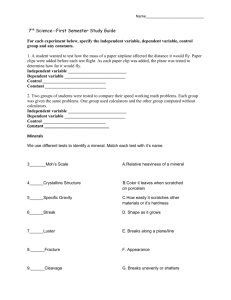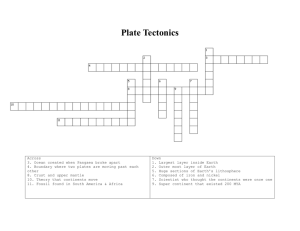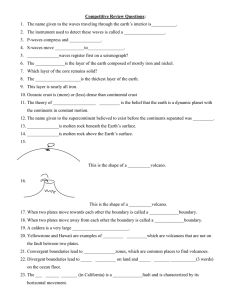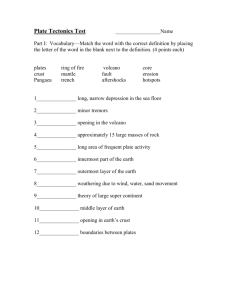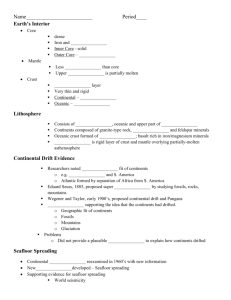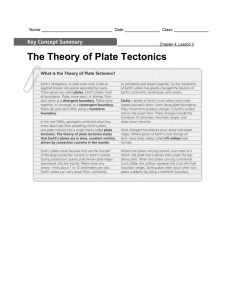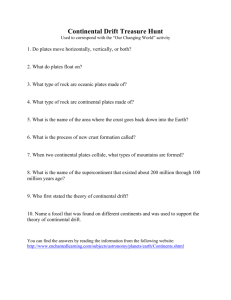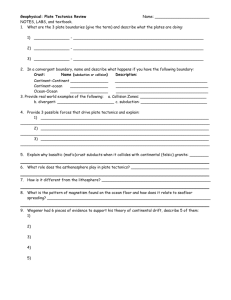Plate Tectonics
advertisement
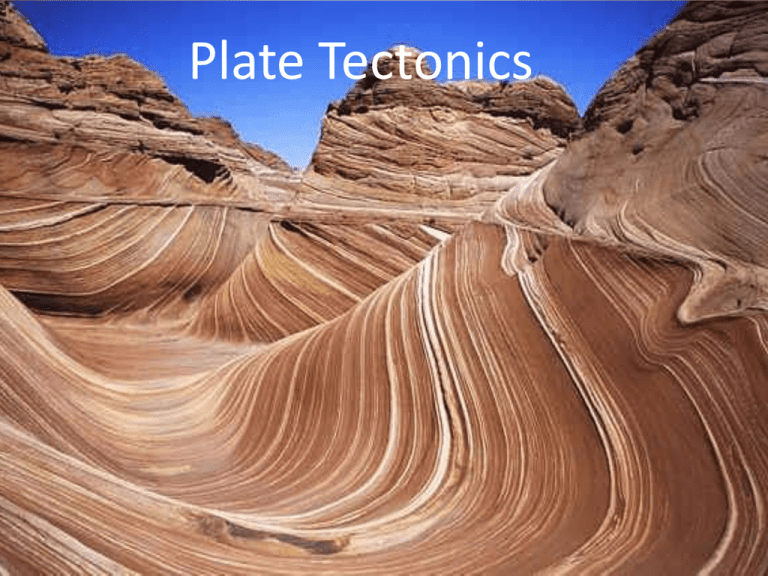
Plate Tectonics Earth’s Layers The crust • Lithosphere- rigid, top of the mantle and Convetion Currents in the Earth's Crust continents • Asthenosphere- softer and hotter layer underneath • They move like pavement resting on hot tar The lithosphere looks like a jigsaw puzzle…on the surface of the earth • Tectonic plates- large slabs of rock parts of ocean crust and continents rest on. Geologists • Geologists study earth processes such as landslides, earthquakes, floods and volcanic eruptions. • Geologists work to understand the history of our planet. The better they can understand Earth’s history the better they can foresee how events and processes of the past might influence the future. Alfred Wegener • A geologist who first proposed continental drift theory in 1912 • His hypothesis was that all of earth’s continents were once one giant land mass • Gradually they drifted apart • His scientist peers and friends did not agree until the middle of the 1900’s Evidence for Continental Drift • 1. Fossil Record: the fossil of the same ancient reptile was found in both South America and southern Africa, but no other place in the world. Both continents must have been joined together at some time in the past. Evidence for Continental Drift • Evidence of Climate change• Fossils of ancient ferns from jungles exist on Greenland, which is now covered in ice. Greenland must have once been near the equator. • Evidence of glaciers existed in South Africa, where the climate is now a jungle and desert in parts. Evidence for Continental Drift • Geology- rock typing found on different continents matches up. Rocks from Brazil matches up with Africa. Carbonado diamondites supernova rocks that impacted on Earth in the Brazil and Central African Republic area (these were originally next to each other, before the ancient Gondwana continent rifted apart). Rock Evidence SuperContinents • Pangaea was formed 270 mya during the Permian and Triassic time periods of Earth’s history. • Most of the dry land was joined together into one huge land mass. • The Permian mass extinction, which wiped out an estimated 96% species about 248 million years ago, was a major event during this time. • Pangaea began to split apart 200 mya http://Pangaea New Technology, New Discoveries • Scientists began mapping the sea floor • Using drilling, SONAR, lasers bounced off of satellites, and undersea explorers, they started making detailed maps of the sea bed. • These discoveries gave evidence of continental drift and how the tectonic plates moved. Sea Floor Spreading • • • • Molten rock rises through cracks It cools and forms new crust Old crust is pulled away Oldest crust is pulled down into trenches into asthenosphere and destroyed. Called Subduction • So…Sea floor is only 180 million years old • Earth continents are 4 billion years old Sea floor spreads because of…Convection Currents Sea floor spreading and convection http://Sea Floor Spreading with Bill Nye/ http://earthguide.ucsd.edu/eoc/teachers/t_te ctonics/p_paleomag.html Divergent Boundary • Where plates move apart • Can form Rift Valley on land Divergent Boundary Example: divergent plate boundary is the Red Sea. Once, the Arabian peninsula and Africa formed a single continent. They are now being ripped apart. The white arrows show the directions the two plates are moving. You can see that a new ocean, the Red Sea is being formed as they separate. Convergent Boundary Convergent Boundary • The dense, leading edge of the oceanic plate actually pulls the rest of the plate into the flowing asthenosphere and a subduction zone is born! Where the two plates intersect, a deep trench forms. • Volcanoes and mountain ranges usually occur along these boundaries. • Think Ring of Fire, Swiss Alps, Appalachian Mountains! Transform Boundary • Two plates scrape past each other • Usually form along plate lines Transform Boundary • Example of Transform Boundary would be the San Andreas Fault in California • Earthquakes usually happen along transform boundaries. Boundaries http://www.classzone.com/books/earth_scien ce/terc/content/visualizations/es0804/es0804 page01.cfm?chapter_no=visualization http://www.geo.cornell.edu/eas/education/co urse/descr/EAS220/2008%20Lectures/Lecture %207%20web/PlateMotionppt.html Magnetic Reversals http://science.discovery.com/tvshows/greatest-discoveries/videos/100greatest-discoveries-magnetic-fieldreversal.htm http://Video explanation of sea floor spreading and magnetic reversals
